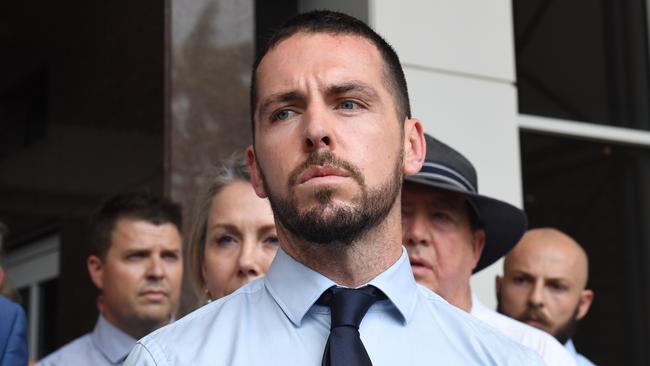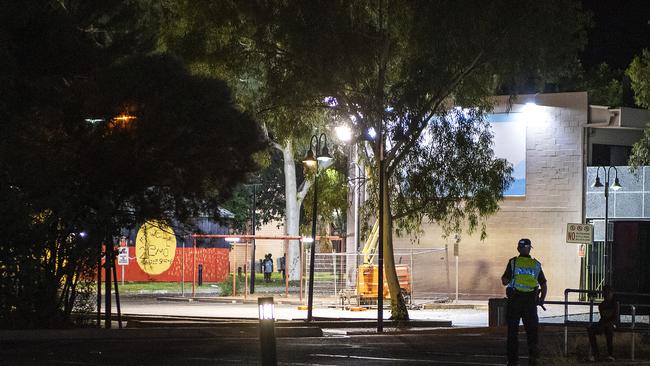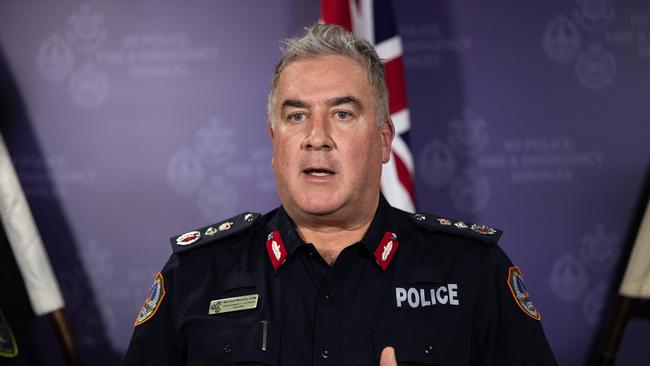Systemic racism will continue to plague Australian police forces if they can’t admit it even exists | Douglas Smith
There is a systemic problem with racism in every police force in Australia but they need to acknowledge it exists before we can solve it, writes Douglas Smith.
Opinion
Don't miss out on the headlines from Opinion. Followed categories will be added to My News.
As the police force in the Northern Territory sits in damage control over allegations that racism is rife within its most elite unit, denying that the problem is systemic will only make it worse.
Hearing the testimony about the culture within the police force of former constable Zachary Rolfe, who shot and killed 19-year-old Kumanjayi Walker at Yuendumu in 2019, is for Indigenous people a reminder that racist attitudes and behaviour are still a systemic problem.
I am in no way saying that all police officers are racist because that is simply not true. It’s not individual officers who are the problem – it’s the system they work for.
Rolfe has alleged a culture of racism within his unit, the Tactical Response Group, with racist awards given to members, including “c**n of the year” for the member who behaves most like an Aboriginal, which required the winner to dress up in a toga and carry a wooden club – depicting a primitive caveman.

Rolfe himself has admitted to using racist language towards Indigenous people and he says hearing every day from other officers in the line of duty “did rub off” on him, because it was the norm within the unit.
“I would say that I am a product of my society or subculture,” Rolfe said.
Shocking right? No, not really. At least not for me. As an Aboriginal person who has been on the receiving end of racism from the police on multiple occasions, it’s something I expect, and I suspect it is the same for Indigenous people all over Australia.
But it is not the incidents that I was subjected to that tell me it is systemic.
No, instead, it is the historic government policies and practices of police forces, since they were brought in to protect the interest of white settlers against the original peoples of this country, which has translated to the way police operate today.
From the mid-1800s, all the way up until the 1970s, police forces were Australia’s spearhead that enforced government policies which included dispossessing Indigenous people of their land and the forced removal of more than 100,000 Indigenous children (Stolen Generations) from their families from every corner of the country.
Like Rolfe says, he is a “product” of his environment – so too is every police force in Australia.
Police forces in Australia have been over-policing Indigenous people for more than a century, and it still happens today, when we see the over-representation of Indigenous people being incarcerated, which has also resulted in the over-representation of deaths in custody.

One of the most horrific statistics in this country is from the NT, where almost 100 per cent of children incarcerated in the Don Dale Youth Detention Centre are Indigenous. It has been that way since it opened in 1991. It was the same year the Royal Commission into Aboriginal Deaths in Custody ended, which produced 339 recommendations. Sadly, a majority of those were shelved and ignored.
I’m not making excuses for what is happening on the streets of towns such as Alice Springs when it comes to the alcohol-fuelled violence and youth running the streets at night committing multiple crimes. But the truth of the matter is, police forces have helped create the very issues they are trying to police when it comes to any Indigenous community in Australia.
And what is most disheartening, more than the racism itself, is when the top brass of a police force denies that the problem is systemic, just as the NT Police Commissioner, Michael Murphy did only weeks ago following Rolfe’s evidence.

“We do have pockets of people who continue to use language or behave in a way that’s addressed really quickly, but it’s not wide reaching,” Murphy said.
Saying that racism in any police force in Australia is not systemic means no action will be taken to address it by those who run the organisation, or the government who create the laws and policies the force adheres to.
It also means the problems we see today within police forces and Indigenous communities when the two interact, will also continue, or unfortunately, get worse.
To date, only two state police forces have apologised and acknowledged that systemic racism is indeed a major issue and that Indigenous communities have been unfairly targeted for generations.
In 2018, WA Police Commissioner Chris Dawson said that he accepted that “previous laws, practices and policies” have “deeply affected” the lives of Aboriginal people, and that the WA Police’s involvement in “historical events” have led to “mistrust in law enforcement” by Indigenous people.
The second and most recent apology and acknowledgment of systemic racism came in May last year, when Victorian Police Commissioner Shane Patten apologised unreservedly for the systemic racism within the Victoria Police.
Too often when racism claims are made against a police force, the response is the top brass or a ‘spokesman’ pointing to “mandatory cultural training” being done, which simply is not good enough.
I’m not saying that if a police force acknowledges and apologises for systemic racism that it is going to fix everything overnight, but it will at least show Indigenous people that they are willing to change, and that it is a step in the right direction.
More Coverage
Originally published as Systemic racism will continue to plague Australian police forces if they can’t admit it even exists | Douglas Smith





